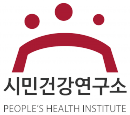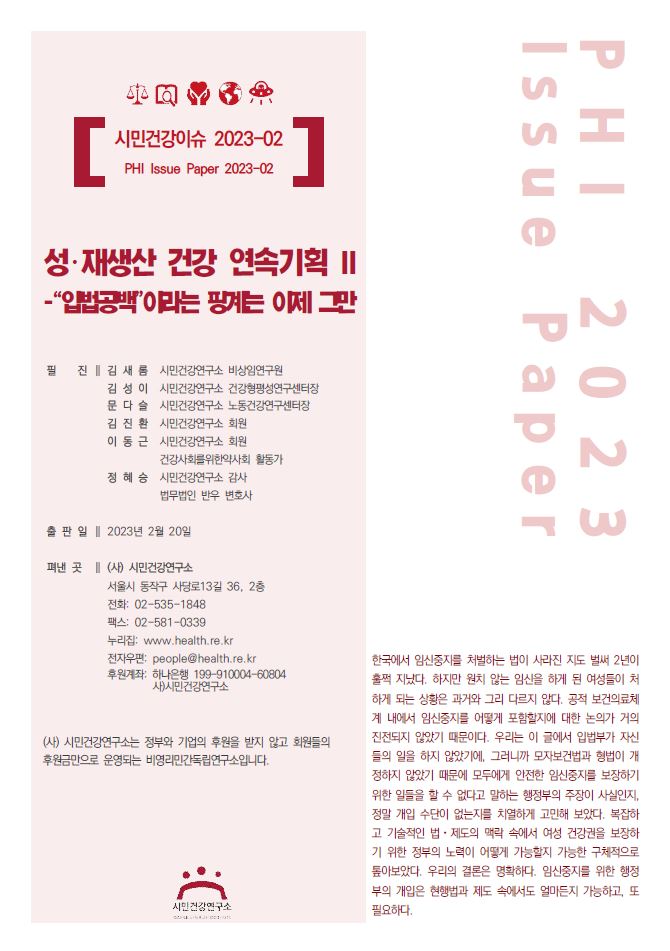시민건강연구소는 회원과 함께 “성·재생산 건강 연속기획 I – 임신중지를 의료로서 보장하기” 에 이어 “성·재생산 건강 연속기획 II – “입법공백”이라는 핑계는 이제 그만” 제목의 이슈페이퍼를 발간했습니다.
우리는 이 글에서 “입법공백”이 행정부가 여성들의 성·재생산 건강을 보장하지 않는 결정의 핑계에 불과하다고 주장합니다. 행정부의 주장과 달리, 모자보건법과 형법이 개정되지 않은 지금도 모두에게 안전한 임신중지는 보장 가능합니다. 우리는 기술적인 법과 제도의 맥락에서 우리의 주장을 논증하는 한편, 현행법과 제도 속에서 정부가 할 수 있는 일을 구체적으로 제안하였습니다.
성·재생산 건강 연속기획 II – “입법공백”이라는 핑계는 이제 그만
한국에서 임신중지를 처벌하는 법이 사라진 지도 벌써 2년이 훌쩍 지났다. 하지만 원치 않는 임신을 하게 된 여성들이 처하게 되는 상황은 과거와 그리 다르지 않다. 공적 보건의료체계 내에서 임신중지를 어떻게 포함할지에 대한 논의가 거의 진전되지 않았기 때문이다. 우리는 이 글에서 입법부가 자신들의 일을 하지 않았기에, 그러니까 모자보건법과 형법이 개정하지 않았기 때문에 모두에게 안전한 임신중지를 보장하기 위한 일들을 할 수 없다고 말하는 행정부의 주장이 사실인지, 정말 개입 수단이 없는지를 치열하게 고민해 보았다. 복잡하고 기술적인 법⋅제도의 맥락 속에서 여성 건강권을 보장하기 위한 정부의 노력이 어떻게 가능할지 가능한 구체적으로 톺아보았다. 우리의 결론은 명확하다. 임신중지를 위한 행정부의 개입은 현행법과 제도 속에서도 얼마든지 가능하고, 또 필요하다.
Stop using legal limbo as an excuse! – PHI Series on Sexual and Reproductive Health and Rights Ⅱ
The South Korean constitutional court decriminalized abortion in April 2019, yet the condition of women who face unwanted pregnancy has not improved much despite the official nullification of the Criminal Act that made abortion illegal on January 1st, 2021. We argue that the government and healthcare providers are more than reluctant to ensure equitable access to women’s reproductive health services, resulting in inertia and nonfeasance.
Our investigation found that the Ministry of Health and Welfare issued an official document stating that abortion services before the gestational age of 24 weeks, outside the permitted limit imposed by the ‘Mother and Child Health Act,’ should be considered legal healthcare services not covered by the national health insurance scheme (Bi-Geup-Yeo). This official document was a response to the official inquiry by the Korean Society of Obstetricians and Gynecology.
However, the government and healthcare providers have been behaving quite the opposite in the public sphere regarding the discussion of abortion rights and the government’s obligation to ensure women’s reproductive health rights. The Ministry of Health and Welfare, accountable for expanding healthcare coverage to abortion services and introducing medicine for medical abortion, denies its responsibility, using the excuse that the legal status of abortion is unclear. Many obstetricians also tend to dismiss the significance of the decriminalization decision made by the constitutional court by denying the necessity of policy intervention to improve the conditions of abortion services, and by stating that there still is a legal risk in providing the service without proper legal proof.
We believe that these excuses from bureaucrats and reluctant providers are invalid, as we can find many existing health policies that can improve the accessibility and quality of abortion care. The government only needs to decide to include various cases of abortion in one of the many healthcare services ensured and managed by the current healthcare system and related institutions. According to our technical review of the legal-political status, the government and healthcare providers face no definitive barriers to improving the accessibility and quality of abortion service in Korea, other than their own volition.

